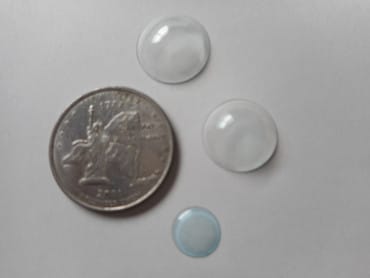Contact Lenses for Keratoconus

There are “basically” three types of lenses, corneal lenses like the Rose K lenses; scleral lenses like the Digiform K lens, and Hybrid lenses like the Synergeyes lens.
Each has its strengths and limitations, fortunately, lens technology advances rapidly and we can expect new designs and better materials.
On the image above from top to bottom are scleral, hybrid, and Rose k corneal lenses.
To start with, much of the lens will depend on your fitter or O.D. and the experience that he/she has with different brands, some fitters will prescribe certain lenses, while others will try other options.
Depending on your situation you may use the Rose K design which is complicated to fit or if you are an advanced case your doctor may go for scleral or corneoscleral lenses, which are easier to fit.
Much of this will depend on how good your doctor is, meaning how much experience he has, and on the state of your corneas, some doctors prescribe piggybacking one hard lens over a soft lens for extreme discomfort cases.
The hybrid lens has a soft periphery and a hard center to provide crisp vision but tends to dry more, so if you have dry eyes you need to take that into consideration, they are also more difficult to remove.
In the end, your needs will dictate what works for you or not, your doctor will give you options and you have to do your job of “adapting” to the lenses and of making the routines of cleaning and maintenance a habit.
Type of cone
Another factor is your type of cone. If you have a globus cone that will require a certain type of lens, different from the lens you need if you have a nipple cone. See the post on “keratoconus type of cones” on my blog.
In resume to have a good fit your doctor has to know the shape of your keratoconus corneas (nipple, oval, or globus), then choose the material of the lens (RPG, GP, or other), and finally the design and parameters of the lens.
Other costs
Another consideration is the cost, specialty contact lenses are expensive and sometimes insurance won’t cover for it, that and the fact that good fitters are not everywhere.
Sometimes you will need to travel long distances to get a good pair of contacts, even if this includes traveling abroad to your own city or country.
If you think about it, is like going to a very good tailor to make you a brand new fitted suit.
Good Luck
Heriberto R.
Hi, I love to improve myself and others. Reach me on social media or at heribertorangel.com
Join #Healty eyes newsletter and get info fast!